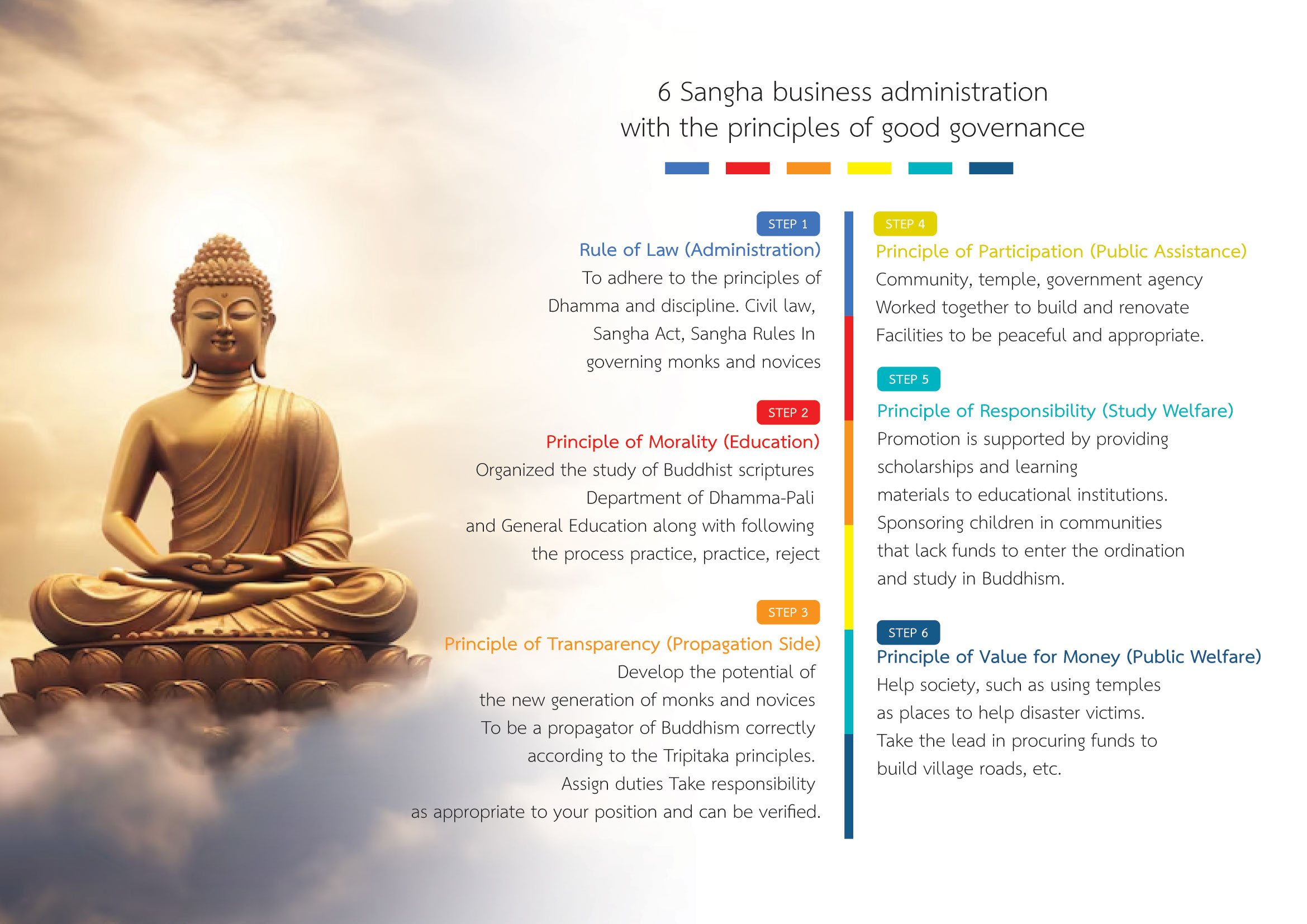THE PROMOTION OF GOOD GOVERNANCE-BASED SANGHA AFFAIRS ADMINISTRATION OF THE SANGHA IN MUEANG DISTRICT, KRABI PROVINCE
Keywords:
Promotion, Administration, Principles of Good Governance, Ecclesiastical AffairsAbstract
Background and Objectives: The administration of the Sangha was of great importance in promoting and maintaining the stability of Buddhism in Thai society, but due to the rapidly changing social conditions and the higher expectations from the public nowadays, the Sangha needed to improve and develop its administration for greater efficiency. This especially involved applying good governance principles focused on transparency, responsibility, and participation in decision-making to build greater trust and faith in religious organizations. This study aimed to examine the promotion of good governance-based Sangha affairs administration in Mueang district, Krabi province, a potential area for development, and an example of implementing these principles. The research objectives were to study the promotion of good governance-based Sangha affairs administration of the Sangha in Mueang district, Krabi province and explore recommendations for promoting good governance-based Sangha affairs administration in Mueang district, Krabi province.
Methodology: This research was mixed-methods, including both qualitative and quantitative approaches. An unstructured interview was conducted with 23 key informants, and a questionnaire was used with 140 quantitative samples. The statistics used to analyze the data included percentages, means, and standard deviations.
Main Results: 1) The promotion of the administration of Sangha affairs based on the principles of good governance by the Sangha of Mueang District, Krabi Province, was at a high level overall. When considering each aspect, it was found that the highest average score was in the area of morality ( = 4.52), followed by transparency (
= 4.51), responsibility (
= 4.51), value for money (
= 4.51), rule of law (
= 4.50), and participation (
= 4.48). 2) The guidelines for promoting the administration of Sangha affairs based on the principles of good governance, from interviews with key informants, can be summarized into six main issues: 1) Rule of law, 2) Morality, 3) Transparency, 4) Participation, 5) Responsibility, and 6) Value for money. These six principles of good governance should be applied to the administration of Sangha affairs in Mueang District, Krabi Province, in order to promote effective administration based on the principles of good governance.
Involvement to Buddhadhamma: The administration based on good governance adhered to rules, monastic discipline, and national laws, developing wisdom and morality through Buddhist principles. It applied good governance principles, promoting transparent management among monks to ensure fairness, equality, honesty, and encouraged compassionate administration.
Conclusions: The promotion of good governance-based Sangha affairs administration in Mueang district, Krabi province, was found to be highly effective, particularly in morality, transparency, responsibility, participation, and value for money. The research indicated that the Sangha had carefully planned and systematically implemented its administration, enhancing transparency and morality in governance. The study recommended that the Sangha should involve the public in administration, improve mechanisms for transparency, and promote the efficient use of resources to ensure the sustainability of Sangha affairs and the stability of Buddhism in the community.
References
Best, J. W. (1977). Research in Education. New Jersey, United States: Prentice-Hall.
Bunmee, P. (2016). Sangha Business Administration: A Case Study of the Sangha Administrative Area, Tha Mai Subdistrict, Samut Sakhon Province. [Unpublished research report]. Rajapruek University. Nonthaburi, Thailand.
Duangsri, P. (2015). The Organization Structure and the Administrations Administrative Role of the Abbots Affecting the Buddhist Sangha Administration. [Master’s thesis, Silpakorn University]. DSpace at Silpakorn University. http://ithesis-ir.su.ac.th/dspace/handle/123456789/232.
Lowmunkong, U. (2010). Proposed guidelines for the development of Buddhist-style ethical leadership characteristics of administrators in schools under Office of the Basic Education Commission. [Doctoral dissertation, Chulalongkorn University]. Chulalongkorn University Intellectual Repository. http://cuir.car.chula.ac.th/handle/123456789/35789.
Phra Brahmagunabhorn (P. A. Payutto). (1996). Government of the Thai Sangha. Bangkok, Thailand: Buddhadhamma Foundation.
Phrakhru Photikittikhun Kittiphong Supanyo. (2018). The Sangha Administration Based on Buddhist Good Governance of Sangha Regional Division 3. [Doctoral dissertation, Mahachulalong-kornrajavidyalaya University]. Thesis Central Library Mahachulalongkornrajavidyalaya University. https://e-thesis.mcu.ac.th/thesis/170.
Rianglaem, S. (2007). Study of Methods to Solve the Problem of Greed in Today's Society According to Buddhist Principles Thera. [Unpublished doctoral dissertation]. Mahachula-longkornrajavidyalaya University. Phra Nakhon Si Ayutthaya, Thailand.
Samamaphan, N. (1986). Buddhist Management. (2nd ed.). Bangkok, Thailand: O.S. Printing House.
Sararatana, W. (2002). Management: Principles, Theories, Educational Issues and Analysis of Thai Educational Organizations. Bangkok, Thailand: Thippayawisut.
Soma-in, C. (2003). History of Buddhism and Administration of The Thai Sangha. Bangkok, Thailand: Soutpaisallaw.
Thanananmethee, K. (2016). Influences of Good Governance and Organizational Culture on Organizational Effectiveness of the Subdistrict Administrative Organizations in the Northern Region of Thailand. Journal of the Association of Researchers, 21(1), 135-142.

Downloads
Published
How to Cite
Issue
Section
License
Copyright (c) 2024 Journal of Buddhist Anthropology

This work is licensed under a Creative Commons Attribution-NonCommercial-NoDerivatives 4.0 International License.








